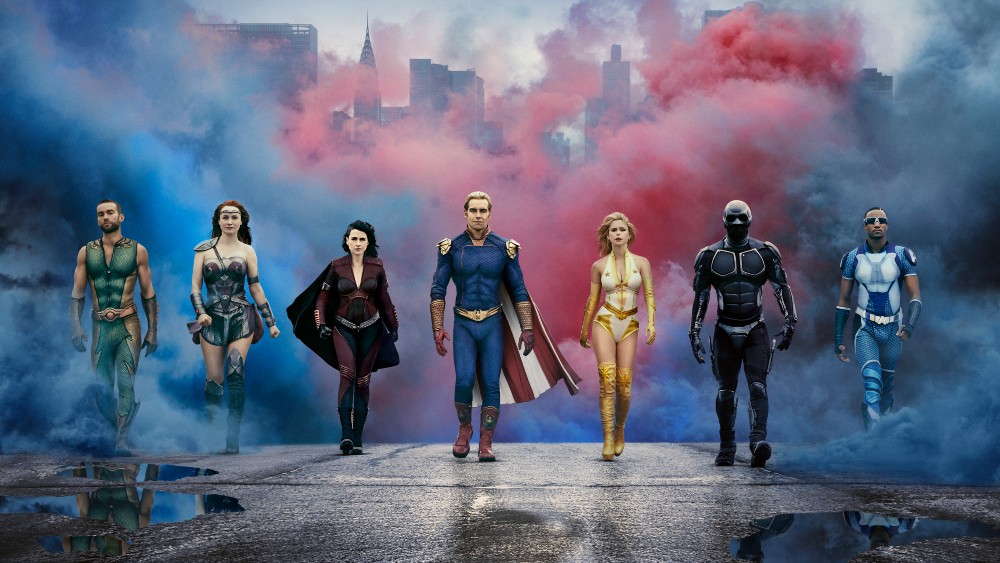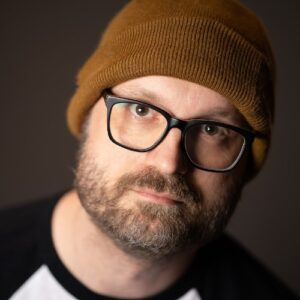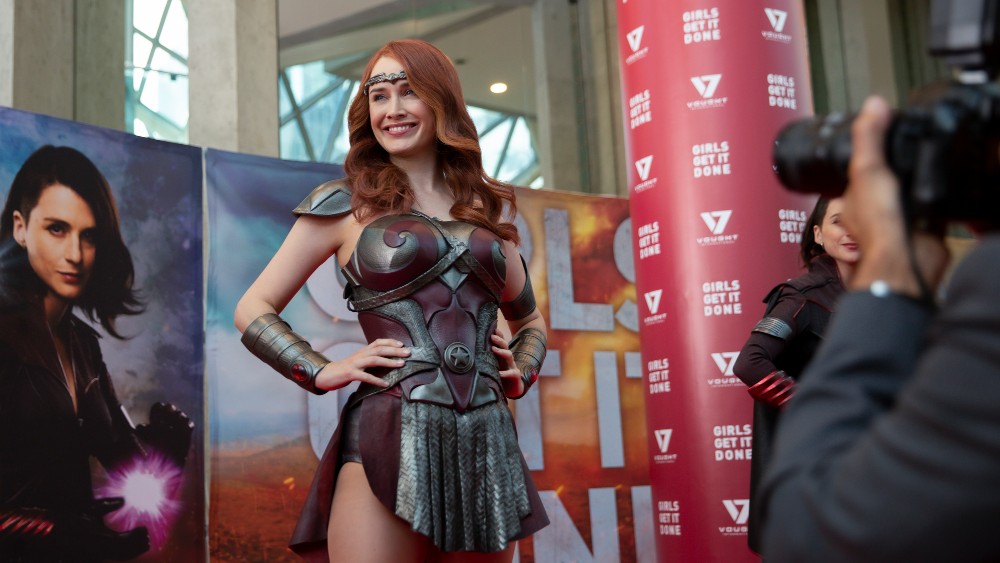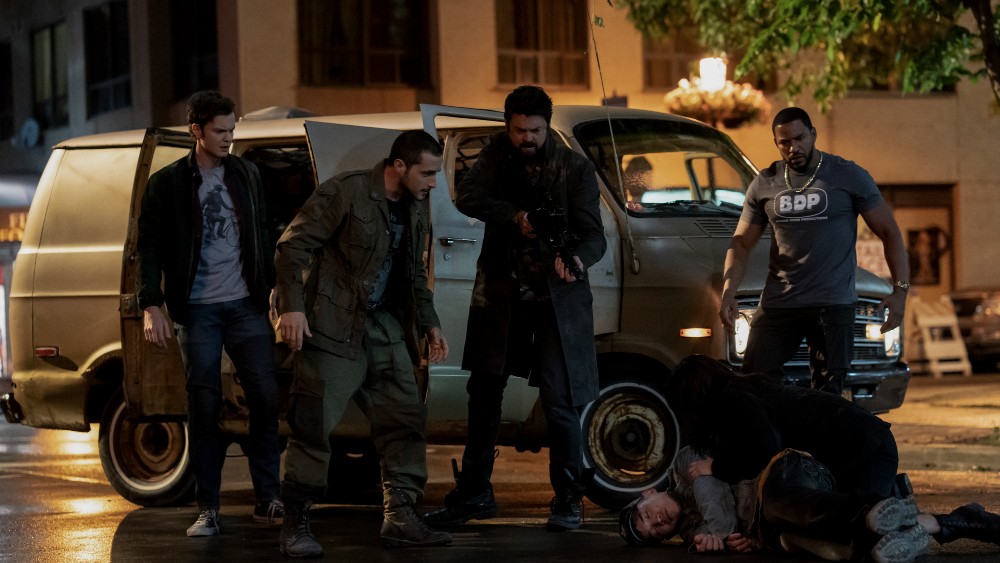
Stephan Fleet is living the dream, just a different dream than he initially anticipated. Fleet serves as Visual Effects Supervisor on The Boys, and counts among his prior credits Timeless, Iron Fist, Daredevil, Under the Dome, Big Love, No Ordinary Family, House, and his first-ever VFX gig, the 2008 reboot of Knight Rider.
But he started out as… an Actor. That made sense, since he’s the son of Actor-Writer Robert Fleet and Actress-Producer-Director Alina Szpak.
Amazon Prime Video’s The Boys went for the jugular in Season Two, fulfilling its promise to deliver 50% more decapitations, terrorists, S&M hookers, and a new pine-fresh scent as its central characters, the corporately-backed superheroes, The Seven, battled supervillains and each other (since most of them are corrupt, vain, or both), and, of course, Billy Butcher and the Boys. The VFX in The Boys are as brilliant as they are gruesome, and the show is arguably the planet’s most gruesome on the planet (in a good way!).
Fleet chatted with Below the Line about his inspirations, working on The Boys, and what constitutes the best compliment he can receive for his work.

Below the LIne: When you were starting out, or even as a kid, whose work inspired you?
Stephan Fleet: Wow, you’re taking it back. Well, so a couple little known facts… I was a child actor, and in 1986, I did a film where Christopher Lloyd played my dad. It was called Legend of the White Horse. It was terrible — it never got released. But I was in the industry at a very young age and got the bug already. I didn’t pursue acting — I was terrible — but I went into theater. I actually have a lot of theatrical background, more than film and television. And there’s a lot of die-hard theater stuff, like the work… It’s going to sound super hoity-toity, but I reference the work of Brecht and Aristotle in a lot of my work.
In terms of movies, it’s got to be Terry Gilliam. Around that same time, 1988, I think, I saw Time Bandits and Brazil, which are amazing, but I saw The Adventures of Baron Munchausen, which was a huge flop when it came out. But to me, it was just the magical world that he built filled with adventure and journey. Actually, I literally have the fish tattoo from it on my arm, so that film, I think, was a huge inspiration. I watch it at least once a year, to this day. And it reminds me, it’s like innocence and purity and fun and adventure and magic and sort of proto-visual effects. That would be my main one. I know there’s also obviously Star Wars and all those too, but really, honestly, it’s that movie. I mean, it’s just like how many other movies create moving paintings? That’s what he was doing, creating moving paintings. He referenced so much art. And it’s just also fun. It’s a really light-hearted movie. It’s so visual, and I think that visual world was something that I wanted to be a part of and create. And I am kind of getting to do that in a weird, twisted, f-cked up way with The Boys.
BTL: What’s your view of how effects have evolved since you first took interest in the craft?
Fleet: Another great example for this is The Last Starfighter, which was one of the first digital effects films. It actually only has something like 16 CG shots if you pay attention. When I was a kid, I was so vividly in love with all these films. I didn’t see the computer-ness of it all. Nowadays, audiences are so much more sophisticated. The leap in what we can do in film and television and cinema in the last 20 years, 10 years, five years, two years, has just been exponential. It’s logarithmically going up. We have these forums now in social media where you can crowd source criticism, which is amazing and horrible at the same time. For the insecure artist, it’s very nerve-wracking. But you have to show up now and you have to bring in sensibilities because the person my age when I saw The Last Starfighter right now is making stuff on their laptop that’s better than visual effects were in movies 10 years ago. So we have a lot of conversations about realism and being grounded and what you can and can’t do in visual effects in this day and age, how to avoid the uncanny valleys, if you will, and “Keep it real” is a big, big topic of conversation in my world.
BTL: Shifting to The Boys. What did you take away from Season One that you put to use in Season Two?
Fleet: There’s a whole business side to it. I know it’s not the most exciting thing to talk about, but there’s a whole economic, business, scheduling, planning thing. I learned a whole bunch after Season One and came back, and I think I did it better in Season Two. We’re going to do it even better in Season Three.
On a creative level, it was really interesting because you’re with a bunch of people that even if you’ve worked with them before, it’s a new grouping. It’s a new team put together, some strangers. You’re searching for the voice and the tone of the show. When you’re doing Season One of a show like The Boys, and we don’t release a TV show weekly, you don’t know what the response is going to be to the show until a year after you’ve made it. So in Season One, you’re kind of working blind. You’re like, “Is this good? I’m just going to do my best job and be sincere and honest with myself.”
And then, you get that reflection after Season One. It’s released, you get feedback, mostly very positive for Season One. Of course, like anybody, in the sea of 1,000 positive comments, you’re going to find the one negative thing and hang onto that. You see what you think you could have improved upon, and you try your best to improve upon it. For me, a big one was Doppelganger, the guy that morphs. He just haunts my dreams, because there’s one shot in the entire show of the entire season that didn’t make it, and it was a Doppelganger shot.

BTL: What happened?
Fleet: We just couldn’t get it past that uncanny valley I was talking about. We couldn’t get it there. And sitting in a room with [Producer] Eric [Kripke], he’s like, “I think it’s better to cut it and do it with audio off camera than to show something that’s not up to our bar.” Going back into Season Two, we had Doppelganger again, so I’m having like night sweats, you know?
BTL: And how did you solve the problem?
Fleet: I sat down and I came up with this extremely detailed motion-control plan and pre-viz-ed it myself. I was like, “I’m going to find all the angles that I know will work with this guy.” So, if you watch Season Two’s Doppelganger work, I think it’s very successful. We play it out of focus. We do clever lights. We do all the things to make it there, but not distract you by it being a visual effect. It’s the magic trick of it all. It’s the “Look over here while we do the magic over here.” And that also was compounded by Antony Starr‘s amazing performance in that scene.
BTL: How freeing is it on your end to have a show that’s as batsh-t crazy as this, to let the imaginations of you and your team run free?
Fleet: That’s part of why it’s incredibly freeing. I would say, actually, believe it or not, all the batsh-t crazy stuff, it’s not coming out of left field. Eric is a very talented and intelligent person who leads a wonderful team of writers. A lot of that stuff’s in the script before it gets to air. It’s not as improvised as you think. There are scenes of improvisation that mostly are with the actors. They give them a lot of freedom in the dialogue at times, but when it comes to the spectacle scenes, the heavy visual effects scenes, the stunt scenes, we do a lot of pre. It’s like absurdity by design. That being said, what’s more freeing for me than that is the fact that the team on this show, Eric, all the directors I’ve worked with, [Executive Producers] Seth [Rogen] and Evan [Goldberg], it’s been a big come-up for me in my career where I really feel like I have a voice at the table with them. They’re very receptive to me. And Phil Sgriccia, our Producing Director.
We have a lot of dialogue going on, and they really listen, so much so that after Season One, they invited me in the writers’ room, and I actually had a whole session with the writers, talking about conceptual stuff that would work better or not work better for the show and visual effects. That has been wonderful, and that gives me the confidence to go to someone like Eric in post or production and say, “I’m going to pitch you this crazy idea. Would it be better to do this than this?” And even if he says, “No, I don’t want to do it,” I don’t feel embarrassed that I pitched something because they’ve given me the forum to do it. I would say, 50% of the time, you pitch something that grows into an idea that becomes something better, and other people latch onto the pitch, and it becomes this collaborative thing. That’s the key, I think, to this show, is the willingness to listen, but also the intelligence to know when to say yes or no to what people are saying.
BTL: You’re not flying solo on The Boys. To your thinking, what makes your team special as a unit?
Fleet: The truth is I am just one of many people doing this. First off, I have a counterpart, Shalena Oxley-Butler, who’s my VFX Producer, and she and I are really like partners. On paper, she handles all the financial responsibilities, the budgeting, and I’m on the creative side. But I would say that we mix the two together. She’s a very creative person and I listen to her input and I feel her financial responsibility. Also, she’s in L.A. I have a team in L.A. and I have a team here in Toronto when we’re doing the show. So, I have a pretty lean team, actually. Season Two, it was me and my other on-set Supervisor, Rian McNamara. Just the two of us. We would bring in day players from local VFX facilities that work on the show if we needed to. All the facilities were great too that worked on the show. We have Coordinators, two Coordinators in Los Angeles and two Visual Effects Editors, and that’s it. That’s the whole production team. They’re all great. We’re like a family. And then the extended family are all the visual effects facilities that work on this show.
I come from working in visual effects facilities. I come from being a Visual Effects Artist for a time in my life, and they’re the core. Ultimately, what I’m trying to do is tap into their talent. I’m a facilitator of talent more than anything. This is the kind of show, it’s almost, it’s a bummer when you look at credits because I’ll get a credit, my team will get a credit, but there’s hundreds of people that come together. It does take a village to make something like this, and I’m hugely respectful of each and every person that works on the show in that regard.
BTL: How did Covid-19 affect what you and your team needed to do?
Fleet: That was really weird. We were already halfway through post-production in the season. Production was done. We were definitely over the hill where we could finish the show. Honestly, most of it was waiting on visual effects and some sound work, by the point COVID hit. Of course, there was this horrible day where everyone was confused, and we’re going home, and we don’t know if we’re going to go back to work the next day. There was a lot of stress with everybody at that exact time, so we go home. In hindsight, maybe it wasn’t the best idea, but [I’d driven an RV across the country], and I thought it’d be clever to just live in it for a while, while I finished the show in between buying houses. So, I was living in an RV in Los Angeles with dial-up internet at the time.
I had to figure out how to get faster internet, which I did. We checked in with our visual effects companies. Everyone needed about a two-week reset, I’d say, where they were like, “Let us figure stuff out.” But man, the post house, Company 3, all the visual effects companies that work on the show, they pivoted within those two weeks. They figured it out. Things got a little slower. We did need to push a little bit, but you don’t get a pandemic every time you’re doing a show, so I think it was completely legitimate. Then it was just doing calls and Zooms, like six to 12 a day from my RV. I felt really bad for my wife because she’s right here and I have a pretty loud voice, and you’re talking about things like, “And the whale, and then, the penis wraps around the neck.” My wife must have been sitting there like, “Oh.” So, it was tough, but we did it, and I’m more proud of everybody for finishing it given everything that was happening. I’m also a little bit happy that we were able to keep some jobs going for a few months. It was a tough time where… Every show was at a certain length of how much they filmed when COVID really started hitting, and if they were less than halfway through production, they’d just shut down immediately. So, all this work just started going away and drying up. I’m happy to report that right now it seems like there’s this huge boom again, and you can’t find anyone to do anything because everyone’s working so much. But it was a
BTL: What would an Emmy nomination mean to you?
Fleet: I’d be completely lying if I was like, “I don’t care about getting an award.” I do care. I’ve never won an award for anything in my life before, weirdly, so I don’t know what it’s like. I think I got a participation trophy for a basketball thing when I was 12, maybe, and I got second place in History Day in high school. I think the takeaway for me would just be that more and more of what I want to do is not so much about winning awards in the literal sense. It’s more about knowing maybe that I’m on the right path to something that helps the people that I love, the people that I work with, the shows, all the creative stuff, keep going and getting better.
An award, to me, would be sliced into 1,000 pieces and each piece would belong to one of the artists that worked on this show, because I know how difficult this show can be, not in a negative way, but we have a high bar. We spend our time with the work. I tell that to people upfront, and I expect people to put the same level of creativity and love into it that I do. When they do that and I can sense that they are, that means a lot to me. So, to me, it would be validation for figuring some stuff out in life, I guess. That being said, I’m also just extremely happy and humbled to have this opportunity at all.
BTL: And last question, what is the bigger kick for you personally? Is it someone complimenting an insane FX sequence, or is it someone not even realizing that a shot has FX in it?
Fleet: Definitely the latter. We don’t have time for this, I know, but there’s a huge conversation in social media and in life about practical effects versus visual effects. There’s been somewhat of a backlash against visual effects. I think it’s a little misunderstood because the only visual effects people really converse about online are the visible visual effects. And every now and then, in fact, my friends at Ghost Visual FX, which used to be a company that was a company… Like two companies ago, I worked with all those guys. They just came out with a reel for Shameless and some invisible visual effects they did making Chicago. It looks amazing. I’ve watched the show. I had no idea it was visual effects. I love that stuff.
We do a lot of that in this show, too. A great example is there’s a scene in season two where they’re just driving along the countryside, and there’s this barn with Homelander graffiti, with a rebel flag on the side of it. One could easily deduce that maybe the Homelander thing is a visual effect. You’re not going to go paint that big thing. But what’s great about that shot is that the entire barn is actually the CG, the whole thing. And no one knows. No one has brought it up. So that actually means a lot to me, and that’s the kind of visual effects that I love to do the most.
The Boys streams on Amazon Prime Video and has been renewed for a third season. Look for a special “Making the Scene” with Mr. Fleet sometime next week, if not sooner.
All photos courtesy Amazon Studios.






